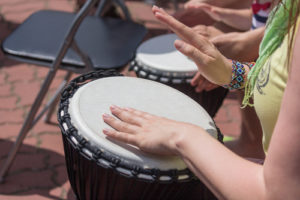By: Design for Change Recovery
April 17, 2017
Categories:
Learning To Play An Instrument In Addiction Treatment Benefits Mind, Body, And Spirit
You are here:
Home
›
Blogs
›
Learning To Play An Instrument In Addiction Treatment Benefits Mind, Body, And Spirit
Music therapy is beneficial in all of its forms. One of the most stimulating forms of music therapy is by giving addicts in recovery the opportunity to learn to play a new instrument.
Mind
- Improves Cognitive Function: Playing an instrument requires a lot of work on behalf of the brain. Time management, keeping music notes organized, creating prioritized time to practice, memorizing new things, learning new skills and more helps the brain improve cognitive functions. Memory is enhanced and the brain is able to recognize the learning process in a new way
- Creates New Pleasure Associations: Dopamine is a neurotransmitter which helps the brain understand pleasure by sending messages to various areas. Addiction is largely about seeking pleasure as well as it is about avoiding pain. Music is pleasurable. Learning a new skill with an instrument and finding success creates an association with pleasure and reward. While the brain recovers from pleasure-seeking through drugs and alcohol, it learns to find pleasure and reward through music.
- Mindfulness: It’s hard to be distracted and successfully play an instrument. Playing an instrument requires focus, awareness, and paying attention. More than concentration, playing an instrument means having to notice how you’re feeling and what you’re thinking in order to bring you back to the present moment.
- Discipline: After treatment, the biggest challenge clients face is maintaining a level of discipline in their recovery program and lifestyle. This is especially important during the first year. Discipline through playing music can act as an example of the discipline it takes to stay sober. A few practices each day leads to big results.
Body
- Stress Relief: Music has healing energy, not just spiritually but through the science of sound waves and vibrations. There is an extra special connection when you are the one making the music. Playing an instrument reduces stress and relieves tension.
- Muscle Memory: Some instruments can be exhausting! It takes new muscle strength to learn to play an instrument. Overtime, this build muscle memory, helping restore the connection between mind and body which is damaged by long term addiction.
Spirit
- Patience: When learning a new instrument, patience truly is a virtue. Only the rare and few prodigies can become masters of their craft over night. Even so, many tend to hit a threshold of capability eventually. Addiction love instant gratification. Playing an instrument helps addicts learn how to wait.
- Self-Compassion: Many addicts develop a “critical voice” in their minds which tell them that they aren’t good enough, among less gentle accusations. Putting progress not perfection into practice with playing an instrument helps in allowing someone to meet themselves where they are.
- Accountability And Responsibility: If you don’t practice playing your instrument, you can’t progress in how well you can play. In recovery we often say it works if you work it. Playing an instrument takes work. So does recovery. When you put in the work, you see the results.
- Achievements You Can See: One of the issues people come across in recovery is not being able to taste the fruits of their labor; so to say that sometimes the progress in recovery is intangible. With playing an instrument, you can see when you “get better” at something. This reinforces the fact that you are capable of taking action and creating change in your life.
- Humility: Learning to be humbled by watching someone with years of practice excel in their skill is a good lesson in humility. Addicts can develop an ego issue, which for some people takes years to remedy. Playing an instrument is humbling in realizing you can’t do more than you can do at any given moment.
There’s freedom in recovery. Are you ready to be free from addiction? Let the treatment programs at Design For Change show you how. For information on our treatment programs and recovery services, call (877) 267-3646.



